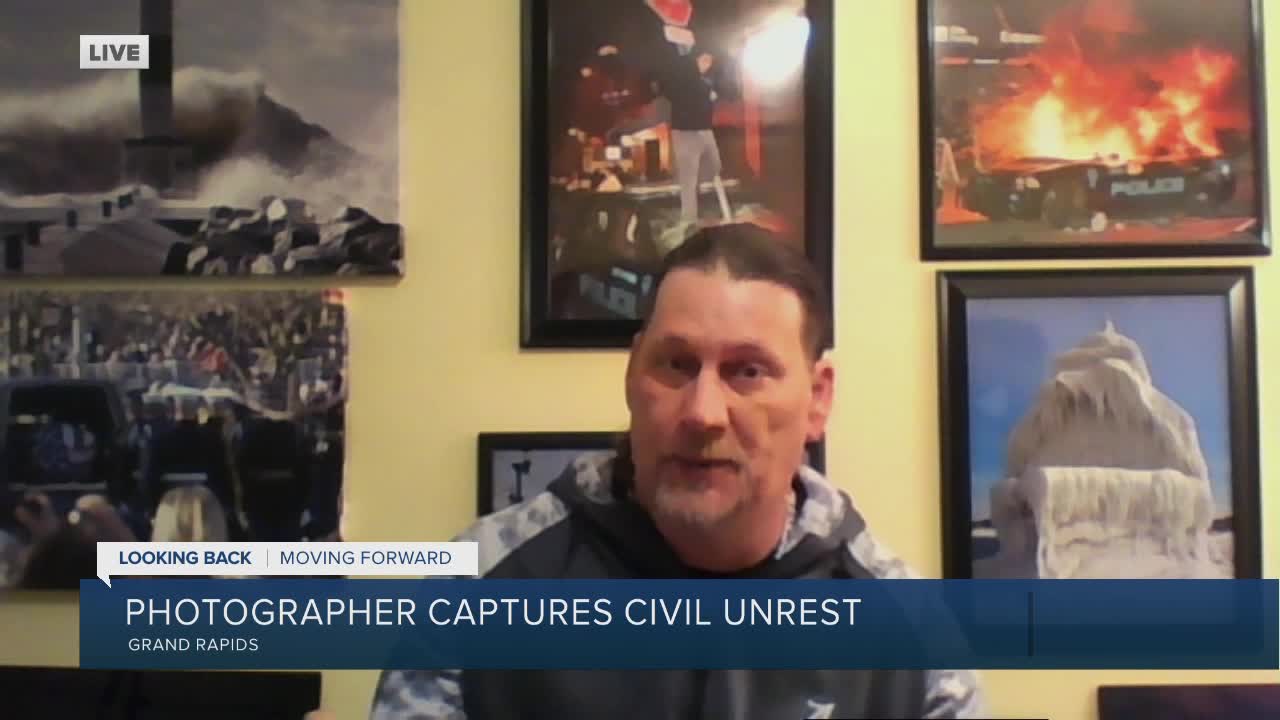GRAND RAPIDS, Mich. — Grand Rapids police and social activists are working to create new laws and a safer police force while protecting the people they serve.
As the social fabric of our nation continues to change one year after the murder of George Floyd in Minneapolis, the emotional scars left behind in the people who lived through the violence are being healed through conversation and action. First, Grand Rapids Police Chief Eric Payne says the need to debrief the situation has led to his proactive strategic plan, ensuring the safety of his community.
“So I think it was an awakening for everyone,” said Chief Payne. “Again, we’re building those relationships, and we're going to do that through our strategic plan and implementing everything that we've said we would do. We'd like to avoid such situations in the future.”
READ MORE: Last year’s ‘record-breaking’ global protests were effective in making change
Chief Payne says the progression of events that night in Grand Rapids started with a peaceful protest, which turned into an unlawful assembly, and eventually turned into civil unrest.
“Once it was an unlawful assembly, it became a riot,” Chief Payne said.
Payne went on to say his experience led to the implementation of his neighborhood policing model, strategic planning and other initiatives to help repair police-community relations. He's also looking towards technological innovation to increase surveillance.
“We'll be looking at drones, or UAVs, but more commonly known as drones to assist us in our efforts and outreach within the community,” said Chief Payne.
He said the department will be as transparent as possible when letting people know exactly how they’ll be using drones in the future. He’s also supporting a nationwide program called Cure Violence, focused on combating the unprecedented number of homicides and shootings in cities like Grand Rapids.
An estimated $2 million in damage was done to businesses downtown Grand Rapids during the uprising. Since George Floyd's murder, 1,068 people have been killed by the hands of police nationwide, according to research and advocacy by Mapping Police Violence.
Chief Payne is keenly aware of the violence coming from departments across the nation, which is why he’s focused his efforts on strategic planning: ensuring communities feel safe at all times, incorporating innovation technology, and community engagement. So we spoke to community leader Tawanna Gordon, the cousin of Breonna Taylor, to understand her thoughts about how relations with police have progressed this past year.
“The ethnicities of diverse communities are just frustrated because it’s like ‘okay, we get a pause to breathe before there’s another incident, police brutality, or killing of a black or brown people,’” Gordon said. “It just needs to stop; it’s emotionally draining.”
Gordon has become a spokesperson for her community, now working with Michigan Rep. Tenisha Yancey to introduce two new bills, putting limitations on no-knock warrants and excessive force used by police.
“We’re not anti-cop; we’re anti-bad cops,” Gordon said. “And there are some bad apples in those departments.”
Gordon says an official introduction of the bill will be announced on the steps of the Capitol very soon. One of her long-term goals is to lead the charge in defunding police through demilitarization efforts, requesting therapists in uniform and shining a spotlight on police brutality.
Chief Payne says the budget they’ve recently approved with the city has not changed from previous years and he does not plan on any defunding efforts to take effect.
READ MORE: Timeline of FOX 17's coverage of the Civil Unrest in Grand Rapids
READ MORE: Black Lives Matter activists reflect on one year since civil unrest in Kalamazoo
PHOTOS: REMEMBERING KALAMAZOO'S CIVIL UNREST FROM ONE YEAR AGO







